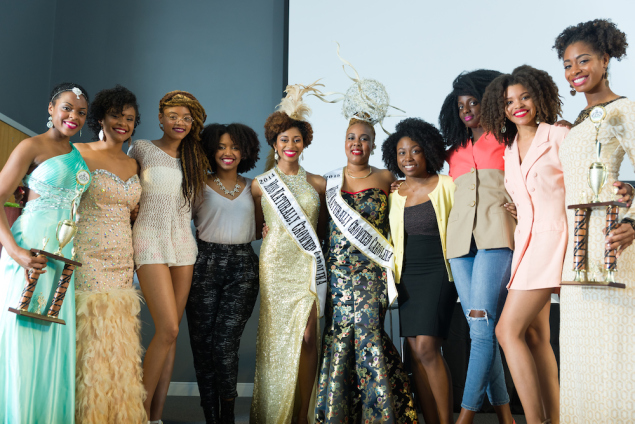Ashley FG. Norwood had no idea that a joke from her mom would eventually evolve into a thought provoking documentary about race relations on her college campus. In the summer of 2014, Ashley traveled to Oxford, Mississippi to begin a two year master’s program in journalism at the University of Mississippi. Her mom came along to help her get settled, but when she stepped onto the campus to see where her daughter would be attending, she was a little taken back by the small number of minority students. “You’re the fly in the buttermilk…” were her mother’s words. That phrase soon after became the title of Ashley’s first documentary “The Fly in the Buttermilk.”
The University was almost a culture shock for Norwood, who is a native of Jackson, Mississippi. Prior to Ole Miss, she attended predominantly black schools from elementary through undergraduate. She received a bachelor’s degree in English with a concentration in journalism from Jackson State University.
A few months ago I got a chance to meet Ashley for the first time in person during Jackson Indie Music Week. Beforehand we had only interacted through social media. Her documentary was selected to be screened during the short film segment of indie week. When I approached her after the screening to introduce myself, she smiled and hugged me like she had known me for years. I caught up with her recently for an interview to learn more about her story and the making of “The Fly in the Buttermilk.”
Check out our interview below.
Ashley E: Has writing/storytelling always been your interest?
AN: Writing has always been my passion. As a kid I would write on my mother’s walls, write scripts, and create shows with my stuffed animals and barbie dolls. I was always creative with what I had. When my older brother left for college I had a lot of time to myself.
Ashley E: So with your background why did you decide to attend Ole Miss?
AN: Ole Miss was never my first choice. There were days when I would sit on campus in the Grove, look around and ask myself why I was there. The school was not a replication of West Jackson where I grew up or any of the public schools that I had previously attended. Ole Miss was ranked high on a list of accredited schools and it wasn’t far from home. This was my first time leaving Jackson. I also received a minority graduate student scholarship that allowed me to basically attend school there for free.
Ashley E: What made you decide to create the documentary “The Fly in the Buttermilk?”
AN: During my first year at Ole Miss I had to work on a story for one of my classes. Initially I didn’t even want to do my project in Oxford, but the story I was working on back at home didn’t come through. One day I went to “Union Unplugged” which is a weekly lunch-time event held outside in front of the student union. It’s put on by the Student Activities Association. Different organizations reserve an hour to pretty much do whatever they want. Some of the organizations will provide health awareness information, and other general information to the student body. A dj comes out so everyone is there just having a good time. The black greek letter organizations would sometimes stroll and step to represent for their sorority or fraternity. While at the event I overheard a conversation between two white girls. The girls were disgusted and irritated by what was going on by the black greek organizations and they were making rude comments.
I mean I get it…… not understanding other cultures but to be rude and racist is just not right. One of my guy friends tried to explain to them about black greek letter organizations and the significance of what they were doing, but they still didn’t understand. My friend ended up riding the same bus with the girls after the incident so he called me and let me know. I left class and came to where they were and I pretended to be a reporter. I told them I was working on a story for the school paper regarding the perceptions of black greek letter organizations, and that I had overheard their conversation and wanted to get their input. They were very dismissive. I didn’t even realize at that time I was actually speaking into existence what my documentary would be about.
That is when I realized what I wanted my story to focus on. BGLO’s is a community that is an unlearned part of the school’s history, and the school has not been challenged in giving this history. The representation of the student body across campus is not equal. There are confederate soldier statues, antebellum homes, fraternity and sorority row but we don’t even have a plaque or anything to talk about this piece of history or any minority history. “The Fly In The Buttermilk” was the perfect name because it essentially was referring to a minority population in an atmosphere that is majority white.
Ashley E: How did you research for the documentary and how was the film making process?
AN: I dug into archives and researched a lot of the history about the chartering process. I reached out to older alumni and even traveled to different states to conduct interviews. When I completed my project I was encouraged by one of my mentors to share the documentary on social media and when I did that, it went viral. I was skeptical at first about sharing the documentary because it could be controversial. The documentary eventually got into the hands of alumni that started adding on to the story. There was so much more of the story to tell but I had to leave out a lot because my thesis could only be 15 minutes. I got a chance to have two film premieres on campus and students, administrators, and community members came out. The project took about a year to complete.
Ashley E: How was the response from documentary?
AN: There weren’t many negative responses but some people just didn’t get it. One white student’s response to the film was to have more combined step shows with the white and black greek organizations. That creates the problem because it just becomes appropriation. When we have events you only want to come for the fun. The documentary has definitely made individuals more open to talking and asking questions. There is also a misconception that there is only one kind of black person. Some black people have no idea about black greek letter organizations either and they share the same sentiments as white individuals. These individuals are appreciative about the history because they see it’s black history period
Ashley E: So what do you have planned next?
AN: I’m working on a docu series based on other minority perspectives. It wouldn’t be focused on greek organizations this time. The next film will be about the HBCU experience.
In March of this year Ashley launched FGMedia LLC Media Company. The company will be an outlet to produce her future films as well as films for other filmmakers. She really wants to tap into the Mississippi creative market. Ashley is a higher education reporter for Mississippi Today. You can keep up with her former and future projects here.




